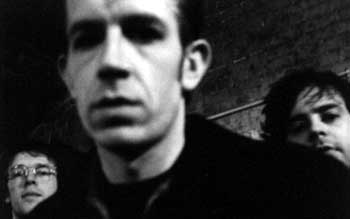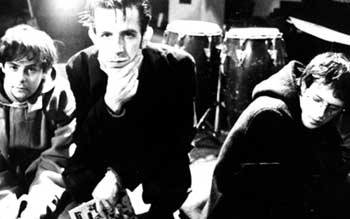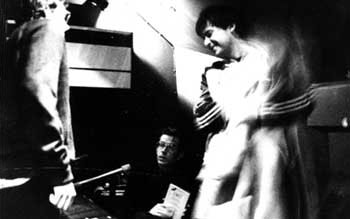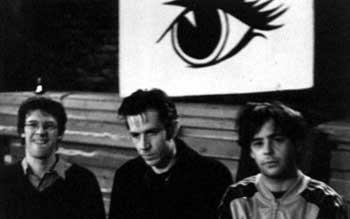Kirk
et Jacques

Kirk Lake:
So you just got back from an acoustic Jacques tour of pretty big venues
[as support to The Divine Comedy]. You played a couple of nights at the
Royal Festival Hall... of course you told me the wrong time for when you
were going to be on and I got there after you'd finished so I didn't see
it... but how was it playing those shows?
Anthony Reynolds: Terrifying to begin with. I mean the Divine Comedy are playing with a band and a full orchestra and I'm going up there with an acoustic guitar. And the front rows, all you can see, are like 17 year old girls who'd seen Neil Hannon on The Chart Show... The first night, in Norwich, I took an E before I went on and I was going to do Morning Light from the Jacques album and I introduced it as "this is a song about topping yourself on a Friday" and there was just like a titter in the distance. Silence and this little titter. And I was just like a rabbit in headlights. I ended up going off after 13 minutes and locking myself in the toilet. But it ended up well. You know you can't hide behind an acoustic guitar.
KL: That's funny you saying about the silence. I did this reading last week. I have some associates that put on a kind of nomadic literature and music club called 1001 Nights and it was one of their events. And I'd chosen this kind of degenerate piece to read about this hitman journalist that I like to write about every now and then. Not too many laughs in it. So I'm there and they make the announcement that I'm about to read and the room suddenly goes completely silent. I read my piece and all the time the room is silent. I got this idea that I was going to look up from the page at the end and the whole audience would've sneaked out and I'd be reading to empty chairs. Normally I'd read a couple of pieces and throw in some of the funny poems and there'd be laughing or I'd get heckled or something. A reaction. But this was silence and then some applause at the end.
AR: That's like the difference I found between doing these acoustic shows and the band shows as Jack. With Jack it's easier to not engage with the audience. When I stop singing I can just turn away and walk to the back. But doing this, sitting down, playing the acoustic I had to talk to them. It made it more rewarding in many ways. Do you find readings, solo stuff terrifying?
KL: Not really. In some respects I'm more comfortable doing those than playing with the band.
AR: I guess if you're playing music or reading then it's like "this is how it is... this is what I think... take it or leave it". Imagine if you were a stand-up comedian. You've got to say "love me, love me" otherwise it doesn't matter. Otherwise there's no point... I was reading this interview with you in a magazine while I was on tour and it described you as gaunt. So here now, it's a sunny day, you've got a t-shirt on, you are really skinny. I don't know why I just noticed that. Do you have ripples of fat under your t-shirt?
KL: No, I just have ripples of bone.
AR: Did you ever think about taking up an exercise. You deal with boxing a lot. Did you ever do that?

KL: Yeah, when I was a young kid. My grandfather was a very, very good boxer and he taught me. I know all the moves. All the combinations. I could talk a good fight now. It's just the physicality of it. I guess I was always kind of weedy as a kid and my grandfather pushed me into the more theoretical side of it for my own safety.
AR: When I was a teenager we used to go to the gym and do boxing training but I found that the jigging about used to make me feel tired.
KL: (Laughs) What just the bobbing and weaving?
AR: Well that and the fact that I was terrified of being hit in the face. You can't really work on technique or movement when you've got your gloves covering your eyes and face. You can't even see where the next punch is coming from.
KL: Well David Mamet, the playwright took up boxing when he was forty odd so there's still time for you to get the gloves back on.
AR: And Mickey Rourke did too. I know we've talked about Bukowski before but on the subject of Mickey Rourke what did you think of Barfly?
KL: Well it's watchable. Just about. It's actually a lot more entertaining if you read the book Hollywood about the making of the film. You can see what a complete twat Mickey Rourke was and probably how much better it would've been with Sean Penn or someone else in it.
AR: I must have seen all the adaptations of the Bukowski books and none of them are any good.
KL: Well Paul Verhoeven has the rights to Women or at least he did have. That could be fun. I will go down on record now as saying that I actually thought Showgirls was a good film.
AR: But I don't know. I can't see the point. It's like trying to rebuild a building as a gramophone record. Nothing can be left alone these days. You can't just have one of anything. It has to be a boxed set. Or if it's a film it has to be a book or the other way around. A director's cut. Whatever. You've got to sell every idea at least twice. Everything has to be sold... Our drummer worked in a memorabilia shop and one time the owner came back from an auction and gets on the phone to an American collector in New York or somewhere, "I've got Elton John's toilet. We'll save it for you. $20,000" Why? What would you want to do with Elton John's toilet? What's the next step? Do you want to be Elton John? I've never understood that. Autographs. A piece of George Harrison's toast. I don't get it. It's just a piece of paper. It's just a piece of toast.
KL: Yeah but I was talking to this guy who was an autograph collector and he's showing me these autographs and its got, I don't know, "For Carrie with love Tyrone Power". So I said why do you collect these when they're not even made out to you. You didn't meet the person. And he pointed to the space about 3" above the page and said that that was the important part, the writing just signified that this star had held his hand above that piece of paper. It had filled that space. So, it's not the piece of toast it's that it's the piece of toast that was held in the hand of the man who made his guitar gently weep. It's Elton cheeks on the seat. It's getting closer. A symbol. I find that kind of fan behaviour quite interesting. Anyway you must sign autographs now.
AR: Because it's rude if I don't. Though of course sometimes I can still be rude when I do. There was this one guy in France who was being a real pain and he asked for me to sign something and I just wrote "thanks for being an obnoxious cunt" and he's showing it to all his friends. Look. Look...
KL: The last two things you've worked on are the single with me and the Jacques album with Momus. With our one it was just me giving you and Matthew a set of lyrics each but with the album it was your songs produced by Momus. Do some songs appear to you as Jack songs and some as Jacques songs? Is there a difference in the approach to the material?
AR: Well Jacques can be anything. Matthew is thinking of putting out an instrumental album. It could be George [Jack's keyboard player] playing piano with Richard [Jack's rhythm guitarist] reciting poetry. Anything that doesn't fit into Jack. The record I just did with Momus is just a unique interpretation of certain songs filtered through Momus. It's not how I would've done the record on my own. But that was the whole point. I wanted to be surprised. That's why it was good doing the single with you. It's different ways of working. Jack is a collaboration with all the band members.

KL: But don't you find that compromising?
AR: I do. But that's the point in a way. I'm interested in collaboration. In making mistakes. In being surprised. Seeing how much I can give and how much I can take. I see the main point of the work as being engaged with it. Engaged with something.
KL: I'd go exactly opposite on that. I'd prefer to do things exactly as I wanted them and accept the minimum of input from others or outside forces. I'd say that was the main failing for me in the music stuff I've done. That it's diluted from my vision of how it should be. And that's not to denigrate any of the people I've worked with. I've had the good fortune to work with good people, superb musicians, an excellent producer. It's just that this kind of singular vision I have of what it should sound like hasn't been reached. Maybe that's why I feel that the written stuff is more successful than the musical stuff. I don't know. If you are just writing you are in complete control. Maybe I have dictatorial tendencies. I'm striving to get there still...
AR: But that's a theme in all your writing. That striving. People trying to get out of some situation. To make it better.
KL: (Laughs) That desperate hope that something good could happen.
AR: Like redemption. It's the striving though. Reaching for something. Not even the achievement. Wanting to be Elvis, the boxing themes... trying to get somewhere because you think it might be better. When you get there it's a disappointment. Getting there is the beginning of the tragedy. It's like, what would happen if you made a record and it was exactly as you'd wanted it to be. A perfect record. Exactly how you heard it in your head. What next?
KL: But you do seem to have a far more romantic view of things. Your songs often seem to be about empowerment through love...
AR: ...or sex. Well the biggest criticisms I get are from my girlfriends who say I'm a liar. It's like the songs on the Jacques album are to do with seduction. Leaving this world and finding another... "Give yourself up to me"... They always say you're a liar. You're not like that. In real life you're too unsympathetic. Maybe I'm living out an ideal in the songs. I guess the worse I am as a person the better the songs will be. I don't know.
KL: I think we should wrap it here before we start to admitting more failings.
AR: No we should end on an upbeat, happy question. I can't think of one though.
KL: No.
I have no happy questions.

Photographs
by Helen Tremaine